MUMBAI: As Google for India marks its 10th edition, the company is marking a decade of collaborative innovation that has brought the benefits of technology to millions of users across India. The event focussed on making AI real and tangible across different facets of the country – from the individual, to businesses and society more broadly.
As part of the event, Google unveiled the ‘AI Opportunity Agenda for India’ whitepaper, a roadmap to help deliver on the government’s India AI Mission by focussing on three key priorities – investing in innovation infrastructure, building an AI-ready workforce, and promoting inclusive adoption and accessibility.
“With its digital prowess globally acknowledged, India is poised on the brink of lift-off when you combine its innate ingenuity with the multiplier potential of AI. Today, we shared the many ways in which we’re making AI real and tangible for individuals to learn, do and create more with technology, the exponential unlocks possible for core sectors of the economy, and our commitments towards online safety, skilling and sustainability that will further propel this journey. We are excited to be part of this chapter of India’s digital journey with responsibility and optimism” said Roma Datta Chobey, MD Google India
Accordingly, the event laid out its launches across these three themes:
Bringing AI to every Indian across Google’s consumer products: Google today announced a wave of AI-powered innovations designed to make information more accessible and helpful for people across India. Leveraging the power of Gemini, Google’s most capable AI model yet, the company is transforming its products to be even more helpful, making its latest innovations AI Overviews in Google Search and Gemini Live available in Indian languages. The company also launched new innovations, including a Google Lens experiment that lets users search with a video and powerful features to make journeys more insightful, visual, and safer with Google Maps.
- Speak to Gemini in 9 Indian languages with Gemini Live: In India, with over 40% of Gemini’s Indian language users already relying on voice interactions, Google recently launched Gemini Live in English for even more natural and free-flowing voice conversations with Gemini on phone. Gemini Live is now being rolled out in Hindi, with eight more Indian languages — Bengali, Gujarati, Kannada, Malayalam, Marathi, Telugu, Tamil, Urdu — to follow in the coming weeks.
- Google Search’s AI Overviews in more Indian languages: With a Gemini model customized for Google Search, the company is making it easier for users to find the information they need. The company is expanding its Gen AI experience in Search, AI Overviews, launched earlier this year in English and Hindi, to more Indian languages – Bengali, Marathi, Telugu, and Tamil in the coming weeks. AI Overviews help users quickly find what they need on Search, with links to referenced web pages to go deeper.
- New Google Lens capability to search with video: More people use Google Lens in India every month than in any other country worldwide. Building on this, Google Lens is further revolutionizing how people can search what they see with a brand new way to query: video. Soon, users will be able to use Lens to search with a video and ask more complex questions about things in motion. Google Search’s custom Gemini model will make sense of the video and provide a helpful AI Overview with links to learn more. This capability will soon be available for Search Labs users enrolled in the “AI Overviews and more” experiment, with support for mobile English queries.
- More insightful, visual, safer, journeys with Google Maps: Google Maps is becoming even more visual and insightful, thanks to AI. Using the Gemini model, Maps will now offer helpful summaries of places, analysing billions of reviews to provide users with a quick understanding of what others are saying. This feature will begin rolling out later this month in India. Additionally, Maps is using AI-powered image recognition to help users now search not just for places, but also for specific items and experiences, like “themed birthday cakes” or “unique picnic spots.” By analyzing billions of images, Maps will deliver results that prioritise photos and facilitate exploration through a map for visual experience. Building on its commitment to user safety, Google Maps is also introducing two new weather-related alerts in India: low visibility areas due to fog and flooded roads. Users can both see and report these alerts to keep their community informed.
Google today also announced new tools for merchants to showcase their products more creatively and create a more immersive experience for customers.
- New AI tools in Product Studio in Google Merchant Center, will help businesses showcase products more creatively to shoppers. Image-to-Video Animation transforms photos into eye-catching videos. Businesses can even create visuals that match their unique brand style by uploading an image that represents their aesthetic.
- Google has introduced a new way to help restaurants convert menu photos into formatted online menus. By linking their social accounts through their Google Business Profile, they can also showcase deals from their social media posts, alongside deals from popular aggregators like Zomato, Swiggy, EazyDiner, and MagicPin.
- Through the Google Merchant Center, businesses can now offer chat options via SMS or WhatsApp right from their Search listings, making it easier to connect with customers. India is one of the first markets where this will roll out with a select set of merchants, and will expand to all businesses in the coming months.
Google Pay is expanding its offerings with new partnerships and features, now offering Gold-backed secured loans in collaboration with Muthoot Finance. People across India can now access this credit product, with affordable interest rates and flexible usage options – delivering flexibility to the borrower, and security to the lender.
Google Pay also announced that its Gemini-powered support guide can now answer queries related to credit products, helping users make informed choices in their credit journeys.
Under the Google Health charter, the Google research team has been supporting the National Health Authority (NHA) with thought leadership to help build tools that will enable developers to integrate more seamlessly with the Ayushman Bharat Digital Mission architecture, potentially reducing integration time from up to six months to just two weeks.
Kiran Gopal Vaska, Joint Secretary and Missions Director, Ayushman Bharat Digital Mission: “At the Ayushman Bharat Digital Mission, we are committed to empowering every stakeholder in health with the Digital Public Infrastructure (DPI) being built under ABDM, ensuring seamless access to quality healthcare services, while also making healthcare more efficient and patient-centric. As we continue to build this, collaboration with global technology leaders like Google is invaluable. We look forward to furthering partnerships that leverage cutting-edge technology and innovation to strengthen India’s healthcare landscape with Ayushman Bharat Digital Mission.”
The company also announced that, starting next year, Ayushman Bharat Health Account (ABHA) ID cards will be made accessible on Google Wallet to the more than 600 million ABHAI ID holders in partnership with Eka Care. ABHA ID Cards enable people to store, share and receive digital health information seamlessly with healthcare groups across the country, and support them in better utilizing India’s public health infrastructure for their well-being. ABHA ID holders will be required to authenticate their device – with a fingerprint or a PIN or passcode – to add or access their health ID in Google Wallet.
Deepak Tuli, Co-founder and COO, Eka Care: “This is a major milestone in India’s efforts to digitize healthcare, a crucial initiative led by our honorable Prime Minister under the ABDM. With Google Wallet, we are enhancing accessibility to medical records for citizens. Their ABHA card will be just a click away, securely stored in their Google Wallet, enabling them to access their medical records anytime, anywhere through the Eka Care app.”
Delivering large-scale impact for businesses and individuals through Gemini and Google Cloud
Building on the incredible transformation led by UPI and Aadhar and driving universal scaled impact, Google Cloud today announced their plan to bring together the power of Beckn-enabled open networks and Gemini, by way of an open-source Gemini Agent Framework, available to every Indian business and user.
This framework, powered by Google’s most capable AI model, Gemini, enables users to search and discover listings – from electronics to seeds, from jobs to educational courses – and make transactions seamlessly across key sectors like agriculture and skilling. People will be able to access this extensive and useful information from a single interface, using their voice, on any network compliant app, in the language of their choice.
Farmers can now have access to knowledge, from best practices to market linkages, and even formal credit, all in one place. Glance will be the first app to offer this agent to its 235 million Android users across the country, equipping India’s youth with the skills they need to thrive in the digital economy.
To help export the unique and transformative architecture of India’s DPI stack to enable other nations to build their digital infrastructure, Google Cloud is collaborating with the Nandan Nilekani-led EkStep Foundation to create ‘DPI in a box’. This the company explains is a plug-and-play model based on Open network, identity, digital credentials, and other Digital Public Goods.
As companies look to leverage generative AI to the fullest, many want to be able to control where their data is stored in light of growing regulatory requirements. Earlier this year, Google Cloud enabled organisations using its generative AI capabilities to store their data at rest in India, ensuring sensitive data remains within Indian borders. This includes Generative AI on Vertex AI – PaLM 2, Codey and Imagen models, as well as Text Embeddings and Multimodal Embeddings APIs.
Building on this, Indian organisations across all sectors, including public sector enterprises, will have the option to both store their data at rest and conduct machine learning processing for its cutting-edge large language model, Gemini 1.5 Flash, entirely within India. This provides even greater control and security for organizations using our most-advanced AI models.
“Google Cloud is committed to partnering with Indian businesses and innovators to harness the transformative power of AI. Through initiatives like our open-source Gemini Agent Framework and collaborations on ‘DPI in a box,’ we’re not only advancing India’s digital landscape but also creating a blueprint for digital inclusion,” said Bikram Singh Bedi, VP, country MD, Google Cloud India.
Making investments in Online Safety, Skill development and Green Energy to ensure long-term sustainable growth with AI
To combat evolving scam tactics, Google is soon piloting enhanced fraud protection within Google Play Protect in India. This feature will analyze and automatically block the installation of apps from internet-sideloaded sources such as a web browser, messaging app or file manager, that request sensitive permissions. In financial scams, fraudsters frequently abuse permissions to access SMS, notifications, and accessibility features to steal one-time passwords, financial credentials, and other sensitive data. This initiative has already shown promising results in other regions, blocking nearly 900,000 high-risk installations in Singapore alone.
Sugandh Saxena, CEO, Fintech Association for Consumer Empowerment: “Giving people safe platforms to access digital financial services rests on several pillars. Our work tells us that fraudsters are misusing open web links to distribute malicious apps to harm customers in various ways. Google’s Enhanced Fraud Protection pilot will be a vital toolkit to plug a critical gap in protecting customers from financial crimes. We believe this initiative will help combat such frauds and we look forward to contributing to the programme.”
Manish Agrawal, Senior Executive Vice President & Head – Credit Intelligence & Control, HDFC Bank Limited: Rapid digitisation of financial transactions in India over the past few years has spelled convenience to millions of people. It also requires consumers to be vigilant against cyber fraudsters. HDFC Bank is committed to educating about safe digital banking practices with multiple initiatives through the year. Google’s new feature ‘ Google Play Protect Enhanced Fraud Protection’ is another step towards user security and app protection. The new feature proposes to protect the user against harmful apps and malware being downloaded onto their device. In the ongoing fight against digital frauds, concerted efforts by all stakeholders are the key to make a safe digital banking environment for all.
Further strengthening its commitment to online safety, Google will launch a new Google Safety Engineering Center (GSEC) in India in 2025, aimed at building and advancing security and online safety products and solutions that meet the needs of users in India. The Centre will bring together our best-in-class safety engineers, local policy experts, government partners, and academia to tackle India’s online safety challenges, focusing on protecting users from threats like scams and fraud, bolstering enterprise and government security, and advancing cutting-edge research and development
Google also announced two long-term partnerships to advance its sustainability goals in India. Together, these are expected to add 186 MW of new clean energy generation capacity to the Indian grid by 2026. These partnerships demonstrate Google’s dedication to the transition to a 24/7 carbon-free future and our commitment to support the growth of clean energy in India.
The first collaboration with Adani Group will involve procuring bundled energy solutions to advance decarbonisation of Google’s cloud services in India. This includes clean energy supply from a 61.4 MW solar-wind hybrid plant to be developed in Khavda, Gujarat, and expected to start commercial operations in 2025. The second collaboration with CleanMax enables a portfolio of 125.4MW of new clean energy projects, consisting of 66 MW solar in Rajasthan and 59.4 MW wind in Karnataka. These projects are expected to start commercial operations in 2025 and will deliver carbon free energy to the grid where Google operates offices and cloud regions in India. Google’s long-term commitment to these projects provides crucial support to secure the necessary financing, making these clean energy projects a reality.
“These projects will power Google’s growth in India and advance our 24/7 carbon-free energy goals, aligning with our broader strategy to scale up and secure cost-effective clean energy across data centers, offices and other operations in the APAC region,” said Giorgio Fortunato, head Clean Energy and Power Google Asia Pacific.
As the rise of AI transforms our world, it is imperative that this revolution is inclusive and takes every Indian along. To ensure that Indians are equipped to seize emerging opportunities, Google today announced the launch of AI Skills House, designed to empower 10 million Indians with AI literacy.
This comprehensive programme will offer Google’s flagship AI courses to a diverse audience, including students, job seekers, educators, developers, and civil officials. Courses, including, Introduction to Generative Al, Introduction to Responsible AI and Introduction to Large Language Models, will be available for free on YouTube and the Google Cloud Skills Boost platform. These courses are available in English, and will extend to seven Indian languages soon. Google is also bringing the Google AI Essentials and GenAI for Educators courses to Hindi speakers.
Google will strengthen this commitment through ongoing efforts through Google Career Certificates and industry-specific programmes to foster AI readiness.
In addition, Google.org, Google’s philanthropic arm, announced a $4 million grant to the Central Square Foundation to promote AI literacy across underserved communities in India. This grant will support the non-profit, which is dedicated to enhancing the learning outcomes of school-going children across India, in its new initiative ‘AI Samarth’ to equip and create awareness amongst 5 million students, educators and parents across India on the meaningful and responsible use of AI.
Shaveta Sharma-Kukreja, CEO, MD, Central Square Foundation: “As AI increasingly continues to deeply influence our lives, there will also be an impact on the future of education, and hence there’s an urgent need to equip our communities with the knowledge to engage with AI thoughtfully. The AI Literacy initiative aims to empower over five million students, parents, and educators on the meaningful and responsible use of AI. CSF is proud to anchor this ambitious initiative, collaborating with academic institutions and ecosystem organisations to drive widespread AI literacy and ensure informed engagement with AI across India’s educational landscape.”
Google.org will provide pro bono support through its Fellowship programme through which Google.org Fellows will work full-time pro-bono with Rocket Learning, a non-profit working to transform Early Childhood Development (ECD) across India. This support will help build an AI-powered personalized coach ‘Saheli’ that will support millions of 3-6 year olds across the country in their learning journeys towards foundational literacy and numeracy skills. This effort builds on the $1.5 million grant that Google.org made previously to Rocket Learning as part of the AI for the Global Goals challenge in 2023.
Vishal Sunil, CTO, cofounder Rocket Learning: “We’re thrilled to receive funding and pro bono support from Google.org to enable all children in India to reach their fullest potential and boost their collective IQ. With the support of the Fellows, we are eager to deepen our understanding of personalised learning’s impact and are committed to making quality early education accessible to every child.”

















